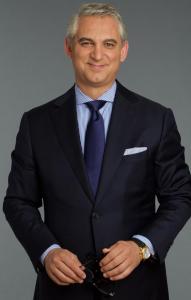Dr. David Samadi: It's Time To Raise Prostate Cancer Awareness for Black Men
NYC Prostate Cancer Expert Dr. David Samadi Urges Black Men to Take Action Against the Second Leading Cancer Killer in Men
February is Black History Month providing an opportunity to highlight these disparities, raise awareness, and recognize the efforts to improve Black men’s health. “By addressing these challenges head-on, we can encourage more Black men to take charge of their prostate health through education and early screening,” says Dr. David Samadi, author of 'Prostate Cancer, Now What?'
“We can’t ignore these statistics—Black men are being diagnosed later, with more aggressive disease, and it’s costing lives,” says Dr. David Samadi, renowned urologist and prostate cancer expert. “Early detection through routine PSA screenings and greater awareness can be the difference between life and death.”
While the exact reasons behind this disparity remain unclear, a combination of genetic, social, and healthcare access factors may be at play.
Why Are Black Men at Greater Risk for Prostate Cancer?
Prostate cancer is influenced by several well-established risk factors, including race, increasing age, family history, and lifestyle choices such as smoking. However, research consistently shows that Black men—particularly African American men and Caribbean men of African ancestry—face a significantly higher likelihood of developing the disease.
“The ACS report shows that Black men in the U.S. and the Caribbean have the highest prostate cancer rates in the world,” says Dr. David Samadi. “And for those who smoke or carry excess weight, the risk of developing a more aggressive or even fatal form of the disease is even higher.”
Another group of men at a higher risk for prostate cancer are men who have certain inherited genetic conditions (such as Lynch syndrome and BRCA1 and BRCA2 mutations). While genetics play a key role in prostate cancer risk, they are only one piece of the puzzle. Social and healthcare disparities, including limited access to quality medical care and lower screening rates, contribute to the increased risk. Studies indicate that Black men are less likely to undergo prostate cancer screening, which can lead to later-stage diagnoses and poorer outcomes.
“Lack of awareness is a major factor,” Dr. Samadi emphasizes. “Many men simply don’t know they are at higher risk or don’t realize how vital early detection is. Prostate cancer is highly treatable when caught early, and screening saves lives.”
Addressing this disparity starts with education. Raising awareness about the importance of early screening and proactive healthcare can significantly reduce prostate cancer mortality among Black men. “The key message is simple,” Dr. Samadi adds. “Black man over the age of 40, must have a conversation with their healthcare provider about PSA screening. It could mean the difference between life or death.”
When Should Black Men Get Screened?
Current guidelines by the ACS recommends that all men discuss prostate cancer screening with their doctor for certain by age 50. Dr. Samadi recommends starting these conversations at age 40, especially for Black men and those with a family history of prostate, breast, or ovarian cancer, due to their higher risk.
Key Screening Tests
The two primary tools for early detection are the prostate-specific antigen (PSA) blood test and the digital rectal exam (DRE). “A PSA test is a simple blood test that can detect prostate cancer early, often before symptoms appear,” explains Dr. David Samadi, urologic oncologist and prostate cancer expert. “Early detection leads to better treatment options and saves lives.”
Why Are Black Men Less Likely to Get Screened?
Despite their increased risk, many Black men delay or avoid prostate cancer screening due to stigma, distrust in the healthcare system, and cultural barriers. “Unfortunately, cancer is often seen as a death sentence in many communities, which leads some men to avoid screening altogether,” says Dr. Samadi. “But the truth is, prostate cancer is highly treatable when caught early.”
Another challenge is that prostate cancer often has no symptoms in its early stages. “Men tend to wait until something feels wrong before seeing a doctor,” Dr. Samadi notes. “By then, the disease may be more advanced. That’s why proactive screening is so important.”
The Role of Loved Ones
Family members—especially wives, daughters, and partners—play a crucial role in encouraging men to prioritize their health. Open conversations about prostate cancer can break the silence and lead to lifesaving screenings. “Anyone who knows of someone at risk, urge them to talk to their doctor,” Dr. Samadi advises. “It could be the most important conversation they ever have.”
Addressing the Disparity
Reducing racial disparities in prostate cancer outcomes requires increased awareness, access to care, and participation in research. “We must work to close the healthcare gap and ensure every man has access to life-saving screenings and treatments,” Dr. Samadi stresses.
The bottom line? Prostate cancer screening saves lives. Improved technology and early detection mean better outcomes. Black men must take charge of their health, get screened, and stay informed.
Dr. David Samadi is the Director of Men’s Health and Urologic Oncology at St. Francis Hospital in Long Island. He’s a renowned and highly successful board-certified Urologic Oncologist Expert and Robotic Surgeon in New York City, regarded as one of the leading prostate surgeons in the U.S., with a vast expertise in prostate cancer treatment and Robotic-Assisted Laparoscopic Prostatectomy. Dr. Samadi is a medical contributor to NewsMax TV and is also the author of two books, The Ultimate MANual, Dr. Samadi’s Guide to Men’s Health and Wellness, and Prostate Cancer, Now What? A Practical Guide to Treatment, Diagnosis, and Recovery, both available online both on Amazon and Barnes & Noble. Visit Dr. Samadi’s websites at robotic oncology and prostate cancer 911.
David Samadi
Madison Urology
212-365-5000
email us here
Visit us on social media:
Facebook
X
LinkedIn
Instagram
YouTube
Diagnosed with Prostate Cancer? Dr. David Samadi is here for you
Legal Disclaimer:
EIN Presswire provides this news content "as is" without warranty of any kind. We do not accept any responsibility or liability for the accuracy, content, images, videos, licenses, completeness, legality, or reliability of the information contained in this article. If you have any complaints or copyright issues related to this article, kindly contact the author above.


